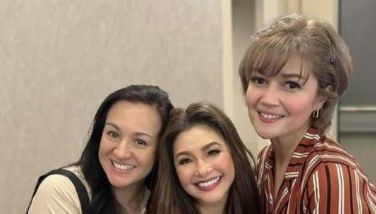Ang Lee: I never stop learning
MANILA, Philippines - He may be a multi-awarded director — celebrated as the poster boy for Asian film talent successfully penetrating Hollywood — but Ang Lee said that he doesn’t feel like he has conquered anything.
“I would like to think, my whole career is a film school. I never stop learning how movies are made. I never stopped learning about myself and I never stop learning about how the world works. I’m a curious filmmaker. I’ve never conquered anything,†said the Oscar-winning Taiwan-born director at a forum that followed the screening of his latest opus Life of Pi, hosted by the Taipei Economic and Cultural Office with SM Aura.
The soft-spoken 59-year-old director electrified the audience, composed of the media and local filmmakers including the 2009 Cannes-winning director Brillante Mendoza and Cinemanila founder Tikoy Aguiluz, with his very down-to-earth demeanor despite his exploits of pushing boundaries, like what he did with Life of Pi, which was adapted from a novel of the same title widely dismissed as unfilmable.
Ang Lee related, “It took four years of my life, 3,000 people working with me (to make it happen). Twelve years ago, I read this book, I never thought it would be made into a movie. I never gave it a thought, but I was just inspired by the philosophy of the book. I’m a filmmaker, a storyteller, and (it was) a project — not so much on the talk about God, but our emotional connection to the unknown — that really draw me in.
“When I was asked to do this movie five years ago, I really tried to crack it. (I thought) maybe I can find a way to tell the story, delving into a circular film structure, and (through) 3D filmmaking which is a totally new cinematic language to me. The making of Pi was a very inspiring film experience,†said the director of the film that earned him his second Oscar Best Director award after Brokeback Mountain in 2005. (To date, he owns 12 Academy Awards, including Best Foreign Language Film for Crouching Tiger, Hidden Dragon.)
Brokeback Mountain, a love story between gay cowboys, proved to be another surprise for him.
Acknowledging the not-so-inspiring performance of his pre-Brokeback film Hulk (2003) at the box-office, Ang Lee readily admitted that after Hulk, “I wanted to retire, but I don’t want to retire (on) an expensive, unsuccessful, angry movie,†drawing laughs from the audience.
“So (I decided) I will just grab anything. I felt Brokeback Mountain was a cheap movie about gay cowboys nobody will see, strictly art house, nobody wants, but I just don’t want to get angry with me. I told the producer if ‘You want me to make this movie, anybody who gets on my nerves, just get them away from me. That’s all I’m asking.’ But who knew, that’s one of my biggest commercial successes.â€
Despite his directorial stature that can command as humongous funding support as $130M (for Life of Pi, for example), he won’t allow himself to be labeled as “Hollywood.â€
“I refused to be called Hollywood even though I can make very expensive movies. In some ways, I still like to think I cannot be categorized. I’d like to have my independence. I have done the cheapest movie, I have done the most expensive and I’d like to have that freedom to express myself... doing what I think and doing my best, then find my audience and somehow it works out for me, “ said the director, whose foray into Hollywood in 1995 via Sense and Sensibility was paved by his melodrama trilogy Pushing Hands, The Wedding Banquet and Eat Drink Man Woman (from 1993 to 1995).
He’s not too keen either with labels attached on his films. “I don’t want to set boundaries. My most expensive movies such as Pi and the Hulk, I think of them as art films, while my smallest movies such as The Wedding Banquet, or my very first movie, Pushing Hands were really, really cheap at half-a-million US dollars and released outside of Taiwan as art house, but to me, they actually were very commercial... So, to me, it doesn’t really matter (laughs), but I think independent in spirit.â€
Nevertheless, Ang Lee believes that times are making it easier for filmmakers to have a shot at success offshore, not limited to the American film market.
Citing his experience with Pi, he said, “This movie is very inspiring to me, how it worked around the world. It didn’t work so well in America which used to be a leader of the market. Eighty-five percent of the income came outside of North America. And that’s good news for us.â€
Although for filmmakers who are eyeing the big league (also known as Hollywood), they have to deal with the fact that it is an establishment set and hardened in its own ways. “It has a certain culture, a way of thinking, operating, you have to deal with it. You can work against it, but you cannot ignore it. If you want to break into Hollywood, you have to know the operation, the film language and how to deal with it, you have to be aware of it, you have to have a producer to lead the way... but you don’t have to be a slave to it... Movie after movie, I try to break the rule, but also I try to negotiate with it.â€
Ang Lee recalled producers wanting him to tweak the end part of Life of Pi wherein Richard Parker the Bengal tiger, that provided unlikely companionship to the teen movie hero Pi as he struggled and then survived life on the high seas, left him “unceremoniously†on the seashore when they finally reached land, with nary a look or turn, as Pi lamented. The producers wanted to make it a less sad ending by imploring Ang Lee to make the tiger, yes, look and turn at Pi for the last time.
“But I was strong enough to fight the fight,†the director mused. “And it turned out Asians love it. We love sadness. The movie showed in China for four weeks only but it did a lot better in America. For me, if you find your audience, you can survive.â€
He added that Hollywood is also “changing†and film markets around the world are standing on their own, so aside from knowing the American film language, it is important for filmmakers to understand how the film language is established across cultures “because the whole world watches movies in certain ways, (you have to know) genres and all that, you have to know your craft to either adapt or negotiate to make a difference.â€
When asked about his penchant for adapting books into film, he said, “I wrote my first three movies, because I was young and nobody was giving me scripts. (It was a) painful and lonely experience, and so I’m happy to be pitched now. But I work very close with the writer.â€
Similar perhaps to how he perceives movie-making as something “spiritual†wherein there are things that are beyond him, he can’t really specify elements that make one material attractive to him. It seems the more mystery, the better. “If I understand it, I’d probably not make it.â€
Nevertheless, he won’t be “locked†into the literature when turning it into film. “I like to be inspired by a book then put it aside... The book no matter how revered it is, I refused to be a translator of a book into cinema. I chose the material because I want to do something cinematically about it. I just snatched a good idea, and put aside what I didn’t care about. I had that freedom. Sometimes I would get along with the writer, sometimes I don’t. I just tell them it’s your book, this is my movie, see you at the premiere.â€
One thing that helps him with the execution of his diverse films is his being an “outsider.â€
“Over the years, I realized there’s nothing I can do to change that. My parents moved to Taiwan, we’re outsiders, then I went to America of course as a foreigner, I was smaller, weaker (laughs) and everyone seemed smarter because I didn’t speak the language, and they looked bigger to me, so very intimidating. Then when I go back to China, I’m Taiwanese, so I’m never really included in any nationality or culture, except in any traditional Asian culture.
But “being an outsider, accuracy is actually easy (to achieve) because you don’t assume you know, you’re diligent, you study, you research and you’re very careful about accuracy. The subtext you see right away, that’s the benefit.
“At the end of day, movie is about inspiration, it’s not making a statement like I know this thing, I make a statement, you watch. It’s a provocation. People can make movies in their head. I can never make movies as good as how people imagine. Actually, I do have the job... project the people’s fantasies, their emotions, into the movie. And this is one thing I love to do.â€
Yes, he admitted, being an outsider is scary. “You don’t have a sense of belonging, and everybody around is a potential audience or critic. It’s very scary, but scary is good, you tend to do your best when you’re scared. I think if I’m not scared, I could be lazy and my biggest fear is losing my freshness and not doing my best.â€
As to other fresh stuff or dream projects audiences can still expect from him, Ang Lee said that he’s not the type who has a specific checklist of what to do next, saying “I’m a one-movie man at a time.â€
Nevertheless, there’s one person who will keep him on track and make him stick to what he does best.
In his previous interviews, he credited his wife, Jane Lin, a microbiologist, for being his No. 1 support system along with his parents, during the long lull when he couldn’t find work after studying theater at the University of Illinois, then at the Tisch School of the Arts of the New York University for a masters in film production. For many years, he became a stay-at-home dad of two, subsisting on his wife’s income while he wrote furiously on his materials and waited for his break, without ever being questioned.
So, he won’t dare quit, despite those post-Hulk sentiments, otherwise “my wife would kick me out of the house, that’s a big reason, I’m not joking.â€
Although in between movies, he does entertain such thoughts, feeling spent and exhausted more because of having to deal with different personalities and “they can get on your nerves, I have trouble sleeping, I’m like leave me alone (laughs)†but then “my wife would not tolerate me.â€
“As long as I have the stamina (I will keep on doing movies). I can’t imagine life without movies. I don’t know what’s keeping me up. I feel like I’m the slave, not the master, of filmmaking. For the young filmmakers, I think that unless you feel that way, you shouldn’t be making movies. Because people I know who are making movies, they are that kind; they don’t know what’s keeping them making movies but they just have to do it.â€
And one thing he is planning to do is a film in the Philippines.
“I grew up as a neighbor of the Philippines. Where I shot Life of Pi, on top of a hill, overlooking a beach, on a clear day, you can see the northern island of Philippines. And the movie had mentioned Manila twice but I’ve never been here, this is the first time, I’m very excited. I’m planning to do a movie here. I hope I get to do that movie.â€
He didn’t go into details during the forum, but directors Tikoy Aguiluz and Brillante Mendoza revealed to The STAR that part of Ang Lee’s reason for coming here was to research for a 3D film and scout for potential locations, and that from Manila, he will head next to New Zealand for the special effects technology for his film.
“I hope I get to explore filmmaking further in an unknown territory, and one of them is certainly here in Manila,†said Ang Lee, eliciting cheers from the audience, “I’m looking forward to it.â€
- Latest
- Trending




























